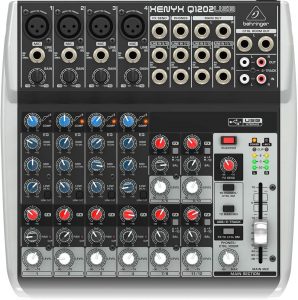The world of podcast equipment can be confusing to novice audio editors and first time on-air talents. Dozens of brands tout the best microphone for podcasts, but which reigns supreme? That answer is multi-faceted, so allow Top Podcast to walk you through it.
One important distinction in choosing a podcast microphone is deciding USB or not to USB. It can be difficult to create a multi-microphone USB setup when producing a podcast, for this reason many professionals opt to record without a computer, saving directly to SD cards.
For a Single Microphone connected by USB – we recommend the Blue Yeti USB Microphone.
The Blue Yeti is an industry favorite. It’s perfect for shows recorded over Zoom or video chat. On the back of this mic there are condenser and pickup pattern options which allow podcasters to find their sound in pre-production. The downside of this mic is it’s inability to operate with other audio devices. You cannot use two Yeti mics on the same computer to record a podcast.
In order to record multiple microphones via USB – we recommend the Behringer Q1202USB 12-Channel Mixer.
Do not be deceived by the name, this device fits four XLR microphones not twelve. The Behringer mixer takes all four audio channels and distills them into one stereo track. Pair the Behringer Mixer with up to four XLR Microphones to create a full in-house podcast studio. This mixer can also be used for music production.
To record without a USB plug-in or laptop, consider the Movo Smartphone Podcast Recording Microphone Kit. This kit offers two microphones that connect directly to an iPhone. When I began podcasting in 2016, nothing of this sort existed. The Movo Smartphone Podcast Kit is an example of innovation within the field, mirroring its predecessors like the traditional Zoom Podcast Recording Kit.
Many of your favorite podcasts are likely recorded on a Zoom Podcast Recording Kit, an early accessory to the podcast industry. This device allows for use of four microphones and the audio is then saved onto an SD card. Regardless of recording method, investing in a high capacity SD Card will allow you to store all of the audio and other content that comes along with your podcast.
These set-ups vary in cost, but none cross the $500 threshold. Be on the lookout for companies attempting to charge $1,000+ for this type of equipment.



 Our TOPPODCAST Picks
Our TOPPODCAST Picks  Stay Connected
Stay Connected